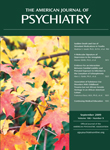Sudden Death and Use of Stimulant Medications in Youths
Abstract
Objective: The authors sought to determine whether a significant association exists between the use of stimulants and the rare event of sudden unexplained death in children and adolescents. Method: A matched case-control design was performed. Mortality data from 1985–1996 state vital statistics were used to identify 564 cases of sudden death occurring at ages 7 through 19 years across the United States along with a matched group of 564 young people who died as passengers in motor vehicle traffic accidents. The primary exposure measure was the presence of amphetamine, dextroamphetamine, methamphetamine, or methylphenidate according to informant reports or as noted in medical examiner records, toxicology results, or death certificates. Results: In 10 (1.8%) of the sudden unexplained deaths it was determined that the youths were taking stimulants, specifically methylphenidate; in contrast, use of stimulants was found in only two subjects in the motor vehicle accident comparison group (0.4%), with only one involving methylphenidate use. A significant association of stimulant use with sudden unexplained death emerged from the primary analysis, which was based on exact conditional logistic regression (odds ratio=7.4, 95% CI=1.4 to 74.9). A comprehensive series of sensitivity analyses yielded qualitatively similar findings. Conclusions: This case-control study provides support for an association between the use of stimulants and sudden unexplained death among children and adolescents. Although sudden unexplained death is a rare event, this finding should be considered in the context of other data about the risk and benefit of stimulants in medical treatment.



